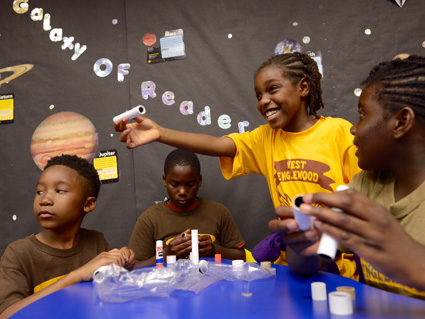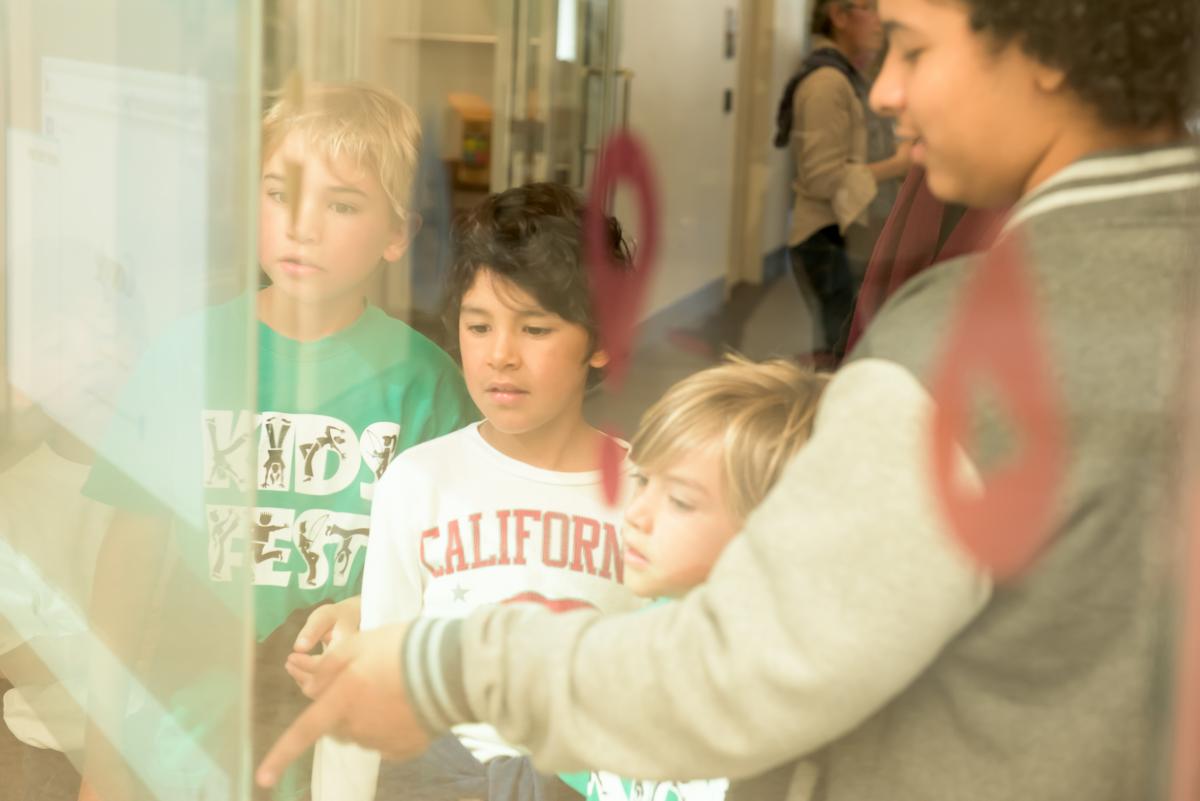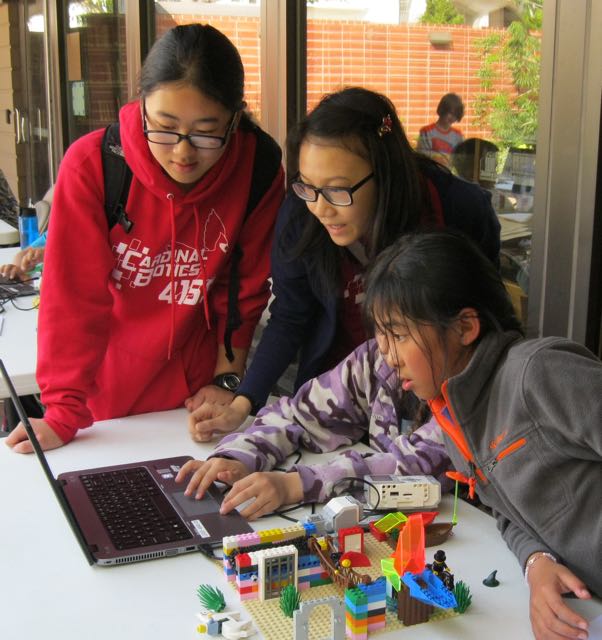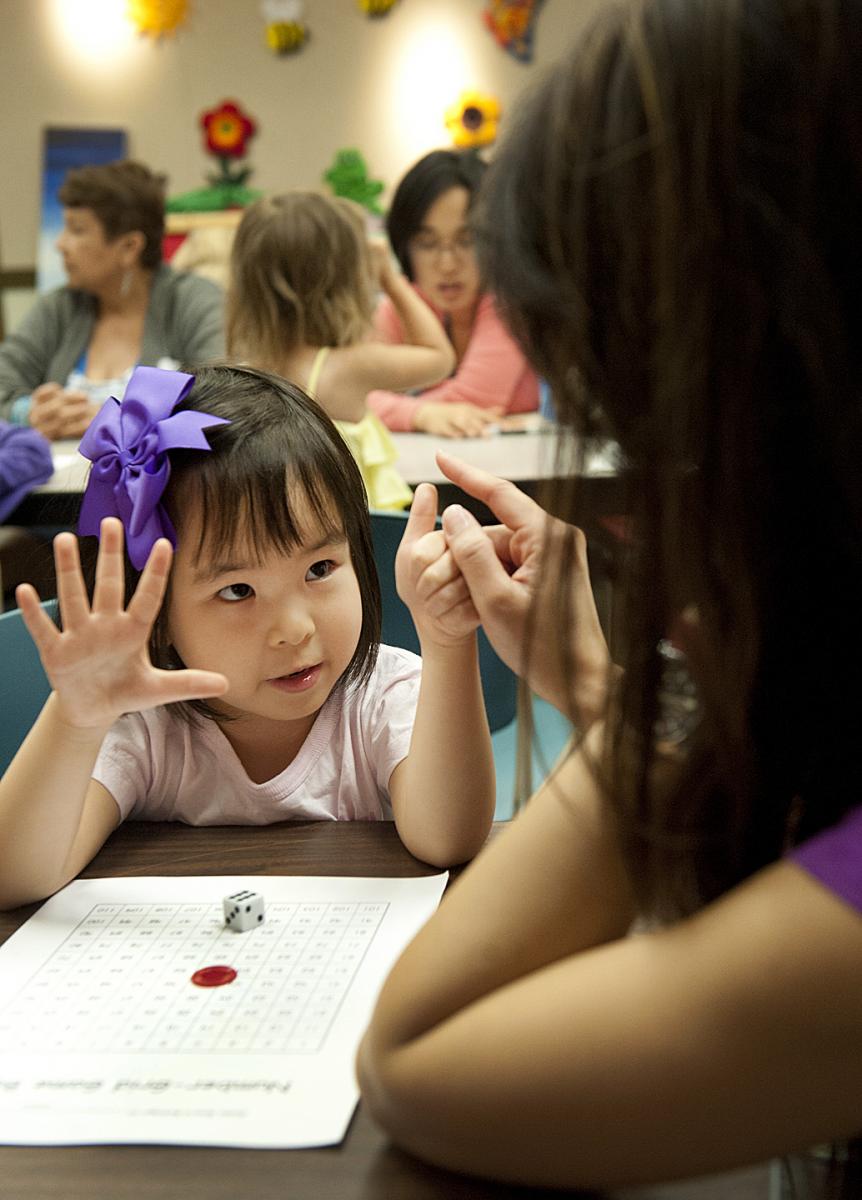 |
Recipient: Urban Libraries Council Grants: Website: www.urbanlibraries.org/summer-learning-pages-309.php Leadership Brief: Libraries Expanding Summer Opportunities (PDF, 317 KB) National Forum Publication: Public Libraries and Effective Summer Learning: Opportunities for Assessment (PDF, 806 KB) |
Contact: Emily Samose
|
Caption: Participants showcase their maker creations during a session of the Chicago Public Library’s Galaxy of Readers event. Credit: Chicago Public Library
|
“Libraries are a central learning hub where any and all can come and learn. They are using their multiple resources and many years of experience to support summer learning interests of diverse learners and all ages." – Emily Samose, Director, Education and Learning Initiatives, Urban Libraries Council |
As the last bell rings on the final day of school, students become carefree. Opportunities await as their backpacks and pencils are set aside – its summer – the time we all wished for as kids and remember with nostalgia as adults.
While we all remember summer fondly, it can be a time where students’ education achievement is impeded. Research has shown that decreased learning opportunities during the summer cause what is referred to as a “summer slide,” which widens the achievement gap, especially for those in low-income households. The “summer slide” and the absence of meaningful learning opportunities during summer vacation have traditionally been addressed through summer reading programs. But public libraries’ summer programs are evolving to include multiple and diverse learning opportunities.
Creating Bonds between Young People and Libraries

Caption: Children at the San Francisco Public Library participate in a demonstration led by an older teen. Many summer learning programs provide opportunities for teenagers to be mentors to younger students. These programs further develop the community’s workforce while creating a sense of ownership and responsibility in teens. Credit: San Francisco Public Library
To better understand the ways in which public libraries are expanding summer opportunities, the Urban Libraries Council (ULC) teamed up with the National Summer Learning Association (NSLA) to conduct a research study designed to uncover the evolving world of library summer programming. Accelerate Summer identified the progressive work of public libraries across the country in creating summer learning programs that expand the already existing summer reading programs. “Accelerate Summer is a joint initiative of ULC and NSLA to reveal how libraries are evolving into leaders in community learning and inspiring innovation in summer learning programs,” said Emily Samose, Director, Education and Learning Initiatives at UCL. “We are seeing libraries becoming central hubs for free, safe and accessible learning through inquiry-based, hands-on programming.”
Finding Spark with Summer Reading PLUS

Caption: Older students participate in a Lego Mindstorm challenge at the San Francisco Public Library. Hands-on learning and the integration of maker spaces allow libraries to evolve from their traditional summer reading programs. Credit: San Francisco Public Library
Through their collaborative exploration, Accelerate Summer identified a number of models that expand learning opportunities in the community. “The Accelerate Summer project is really about discovering the ways in which libraries are evolving their traditional, transactional summer reading programs to expand their offerings and reach beyond ready readers,” said Samose. “These institutions are now providing different kinds of learning activities that serve kids across the board no matter their academic achievement level, family situation, or level of enthusiasm for reading.”
Some of these program models, such as Summer Reading PLUS, enhance traditional, incentive-based summer reading programs by awarding credits and prizes for participation in STEM and maker learning opportunities and other inquiry-based activities. The model recognizes that traditional summer reading programs may reward children who easily reach specific benchmarks while struggling readers fall through the cracks despite their commitment to the program. For example, Saint Paul Public Library in St. Paul, Minnesota, developed the Summer Spark! program, which invites participants to earn points toward prizes for reading and completing learning activities at the library, at home, or in the community. With its colorful reading and activity log featuring check boxes for such activities as, “Make a card and mail it,” “Measure the rain,” “Plan an imaginary trip,” and “write a poem,” the program not only reinforces literacy skills, it encourages skills in additional areas in ways that may appeal to more young learners.
Creating a Fun Learning Environment
A challenge faced by many libraries is designing programs that do not look, feel, or sound like school and are flexible so that participants can drop into classes based on time availability rather than required enrollment. Accelerate Summer found that libraries, such as the Chicago Public Library, are particularly experienced at offering productive drop-in and self-directed summer learning experiences with learning goals.

Caption: A young student participates in summer learning activity at the Chicago Public Library. Drop-in programs such as those at the Chicago Public Library provide easy, flexible access to learning opportunities that build skills that do not necessitate the stringency of traditional school programs. Credit: Chicago Public Library
Chicago Public Library’s Rahm’s Readers Summer Learning Challenge designs its summer learning program around the framework for 21st Century Learning Skills and incorporates three STEAM/STEM learning tracks through a unique partnership with the Museum of Science and Industry. The program, which had demonstrated success in reaching low-income families and accelerating academic achievement for Chicago’s kids, recently received NSLA’s first-ever Founder’s Award for Excellence in Summer Learning.
Impactful Learning through Focused Enrollment
With focused-enrollment programs, libraries like those of the New Haven Free Public Library and the New York Public Library, address specific learning outcomes such as early literacy and grade-level reading, and target low-income youth and families to bridge the summer gap.

Caption: A group of learners at the New Haven Free Public Library celebrate after a day of successful programming. Many focused-enrollment programs are designed specifically to align with city and state learning objectives. Credit: New Haven Free Public Library
The New Haven Free Public Library in New Haven, Connecticut, works with their local schools to identify struggling kindergarten through third-grade readers and enrolls those students in their READy for Grade summer learning program. The program provides twice -weekly tutoring sessions and weekly family nights with dinner to create a fine-tuned approach for reaching their community’s most at-risk kids.
Unique Partnerships
Summer learning programs are significantly strengthened when they are shaped around broader community learning goals. In establishing local partnerships, libraries are able to reach children who may not have been engaged with the library and its programs otherwise. Examples include supplementing parks and recreation summer camps with the local library’s summer learning activities and engaging middle-and high-school volunteers to help plan and implement programs, which in turn readies them for the workforce. Leveraging these local connections drives the impact of the summer learning program and further establishes the library as the central hub for learning and discovery.
Accelerate Summer: The Next Chapter

Caption: A pre-school student participates in STEM-related exercise during a summer learning event. Early education plays a major role in many summer learning programs, such as those at the Chicago Public Library. Credit: Chicago Public Library
As the summer learning movement builds, the Accelerate Summer team is working on an online toolkit for libraries across the country to help them replicate best practices when implementing their own summer learning programs. With additional funding from IMLS, the team also collaborated with the Metropolitan Group in establishing a National Forum, which helped libraries identify methods to assess the effectiveness of their summer learning programs in addressing the summer slide and where they are making the biggest difference in their communities.